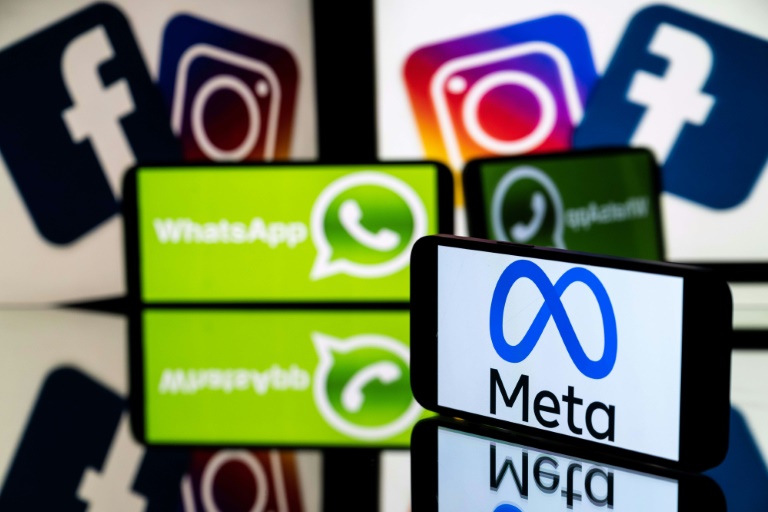SOCIAL
Biggest fines under EU privacy law

Mark Zuckerberg’s social media firm — owner of Facebook, Instagram and WhatsApp — has racked up roughly two billion euros in fines – Copyright /File Brendan Smialowski
Joseph BOYLE and Jules Bonnard
The European Union rolled out its mammoth data privacy regulation five years ago this week, and has since handed down billions in fines.
Ireland’s data watchdog smashed the record for an individual fine on Monday when it demanded 1.2 billion euros ($1.3 billion) from Meta over its transfers of personal data between Europe and the United States.
Here are some of the worst offenders of the General Data Protection Regulation (GDPR):
– Meta: undisputed fine king –
Mark Zuckerberg’s social media firm — owner of Facebook, Instagram and WhatsApp — has racked up roughly two billion euros in fines.
Breaches by Meta have included a mega-leak of some 533 million phone numbers and emails, mishandling children’s data and repeatedly failing to give a legal basis for its data collection.
Meta, along with the likes of Google, Twitter and LinkedIn has its European headquarters in Ireland, a low-tax regime that has courted big tech.
The Irish privacy watchdog has been reluctant to hand down big fines but said in a statement on Monday that the EU’s central authorities had ordered it to collect 1.2 billion euros from Meta.
Austrian campaign group NOYB said it had spent millions in a decade-long legal battle to force the Irish watchdog to tackle the case.
“It is kind of absurd that the record fine will go to Ireland — the EU Member State that did everything to ensure that this fine is not issued,” said NOYB’s Max Schrems.
– US giants: In Meta’s shadow –
Luxembourg lit a torch under the Silicon Valley data industry in 2021 by slapping Amazon with a record fine of 746 million euros.
The country, whose low-tax policies have led campaigners to label it a tax haven, refused to give details of its decision at the time, only providing a brief statement after Amazon revealed the fine in its regulatory filings.
The online retail giant had been sued by a European consumer group claiming personal data was collected for ad-targeting without permission.
However, Amazon denied any breach and promised to appeal. It is unclear whether the fine has been paid.
Google has faced plenty of GDPR pain too.
France’s data watchdog hit the search giant with 50 million euros in fines for a lack of transparency on its Android mobile operating system in 2019 — the biggest such fine of that year.
– Clearview AI: Widespread penalties –
Clearview AI may not be a household name, but it claims to own billions of photos of people’s faces that it sells as a searchable AI-powered database to law enforcement and other clients.
It scrapes the images from the web, often from social media accounts, without asking permission.
Privacy watchdogs in Greece, Italy, France and the UK have all hit the US firm with fines totally roughly 70 million euros, and regulators in Germany and Austria have declared it illegal.
The firm has consistently said it has no offices or clients in Europe and is not subject to EU privacy laws.
The status of the fines is unclear. France issued a penalty of five million euros recently, accusing the firm of failing to pay the initial fine.
– Public bodies, hacks –
In the early days of the GDPR, several watchdogs cracked down on public institutions, raising profound questions about the regulation’s scope.
Bulgaria fined its own tax authority around three million euros in 2019 after hackers stole the details of millions of people.
But several issues in the case were referred to the European Court of Justice, including whether such a hack automatically meant the data controller had not complied with GDPR.
The court has not yet issued a final decision.
Portugal handed down one of the first significant fines under GDPR — 400,000 euros — in November 2018 to a hospital near Lisbon.
The watchdog ruled that the institution had allowed unauthorised access to patients’ data and the case was seen as an early wake-up call for public bodies to get busy with GDPR compliance.
Portugal later gave public institutions three years to adapt to the new regime, meaning the fine was never enforced.
SOCIAL
Snapchat Explores New Messaging Retention Feature: A Game-Changer or Risky Move?

In a recent announcement, Snapchat revealed a groundbreaking update that challenges its traditional design ethos. The platform is experimenting with an option that allows users to defy the 24-hour auto-delete rule, a feature synonymous with Snapchat’s ephemeral messaging model.
The proposed change aims to introduce a “Never delete” option in messaging retention settings, aligning Snapchat more closely with conventional messaging apps. While this move may blur Snapchat’s distinctive selling point, Snap appears convinced of its necessity.
According to Snap, the decision stems from user feedback and a commitment to innovation based on user needs. The company aims to provide greater flexibility and control over conversations, catering to the preferences of its community.
Currently undergoing trials in select markets, the new feature empowers users to adjust retention settings on a conversation-by-conversation basis. Flexibility remains paramount, with participants able to modify settings within chats and receive in-chat notifications to ensure transparency.
Snapchat underscores that the default auto-delete feature will persist, reinforcing its design philosophy centered on ephemerality. However, with the app gaining traction as a primary messaging platform, the option offers users a means to preserve longer chat histories.
The update marks a pivotal moment for Snapchat, renowned for its disappearing message premise, especially popular among younger demographics. Retaining this focus has been pivotal to Snapchat’s identity, but the shift suggests a broader strategy aimed at diversifying its user base.
This strategy may appeal particularly to older demographics, potentially extending Snapchat’s relevance as users age. By emulating features of conventional messaging platforms, Snapchat seeks to enhance its appeal and broaden its reach.
Yet, the introduction of message retention poses questions about Snapchat’s uniqueness. While addressing user demands, the risk of diluting Snapchat’s distinctiveness looms large.
As Snapchat ventures into uncharted territory, the outcome of this experiment remains uncertain. Will message retention propel Snapchat to new heights, or will it compromise the platform’s uniqueness?
Only time will tell.
SOCIAL
Catering to specific audience boosts your business, says accountant turned coach

While it is tempting to try to appeal to a broad audience, the founder of alcohol-free coaching service Just the Tonic, Sandra Parker, believes the best thing you can do for your business is focus on your niche. Here’s how she did just that.
When running a business, reaching out to as many clients as possible can be tempting. But it also risks making your marketing “too generic,” warns Sandra Parker, the founder of Just The Tonic Coaching.
“From the very start of my business, I knew exactly who I could help and who I couldn’t,” Parker told My Biggest Lessons.
Parker struggled with alcohol dependence as a young professional. Today, her business targets high-achieving individuals who face challenges similar to those she had early in her career.
“I understand their frustrations, I understand their fears, and I understand their coping mechanisms and the stories they’re telling themselves,” Parker said. “Because of that, I’m able to market very effectively, to speak in a language that they understand, and am able to reach them.”Â
“I believe that it’s really important that you know exactly who your customer or your client is, and you target them, and you resist the temptation to make your marketing too generic to try and reach everyone,” she explained.
“If you speak specifically to your target clients, you will reach them, and I believe that’s the way that you’re going to be more successful.
Watch the video for more of Sandra Parker’s biggest lessons.
SOCIAL
Instagram Tests Live-Stream Games to Enhance Engagement

Instagram’s testing out some new options to help spice up your live-streams in the app, with some live broadcasters now able to select a game that they can play with viewers in-stream.
As you can see in these example screens, posted by Ahmed Ghanem, some creators now have the option to play either “This or That”, a question and answer prompt that you can share with your viewers, or “Trivia”, to generate more engagement within your IG live-streams.
That could be a simple way to spark more conversation and interaction, which could then lead into further engagement opportunities from your live audience.
Meta’s been exploring more ways to make live-streaming a bigger consideration for IG creators, with a view to live-streams potentially catching on with more users.
That includes the gradual expansion of its “Stars” live-stream donation program, giving more creators in more regions a means to accept donations from live-stream viewers, while back in December, Instagram also added some new options to make it easier to go live using third-party tools via desktop PCs.
Live streaming has been a major shift in China, where shopping live-streams, in particular, have led to massive opportunities for streaming platforms. They haven’t caught on in the same way in Western regions, but as TikTok and YouTube look to push live-stream adoption, there is still a chance that they will become a much bigger element in future.
Which is why IG is also trying to stay in touch, and add more ways for its creators to engage via streams. Live-stream games is another element within this, which could make this a better community-building, and potentially sales-driving option.
We’ve asked Instagram for more information on this test, and we’ll update this post if/when we hear back.
-

 MARKETING7 days ago
MARKETING7 days agoRoundel Media Studio: What to Expect From Target’s New Self-Service Platform
-

 SEO6 days ago
SEO6 days agoGoogle Limits News Links In California Over Proposed ‘Link Tax’ Law
-
SEARCHENGINES6 days ago
Daily Search Forum Recap: April 12, 2024
-

 SEARCHENGINES5 days ago
SEARCHENGINES5 days agoGoogle Core Update Volatility, Helpful Content Update Gone, Dangerous Google Search Results & Google Ads Confusion
-

 SEO5 days ago
SEO5 days ago10 Paid Search & PPC Planning Best Practices
-

 SEO7 days ago
SEO7 days agoGoogle Unplugs “Notes on Search” Experiment
-

 MARKETING6 days ago
MARKETING6 days ago2 Ways to Take Back the Power in Your Business: Part 2
-

 MARKETING4 days ago
MARKETING4 days ago5 Psychological Tactics to Write Better Emails










